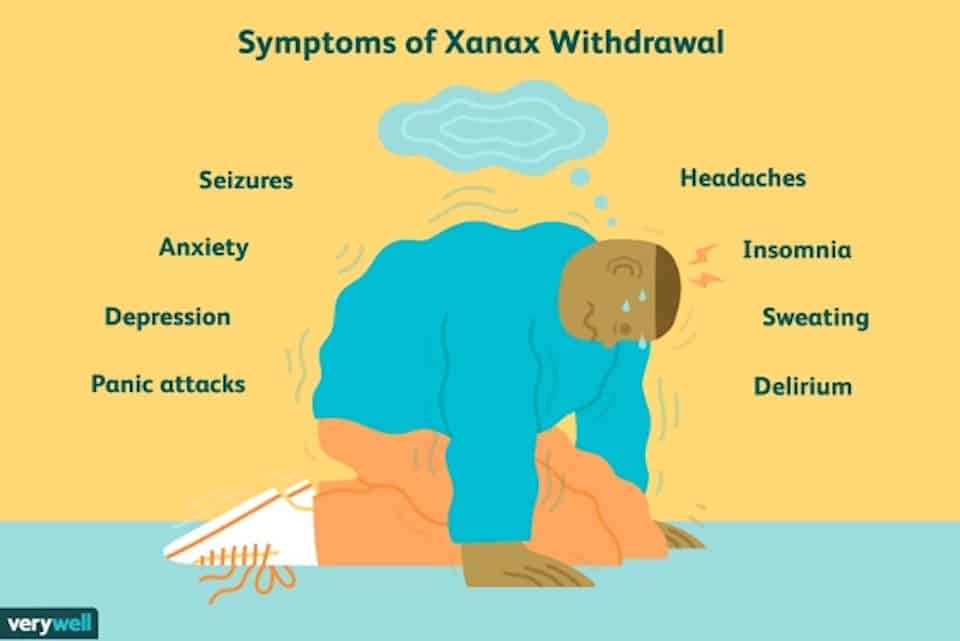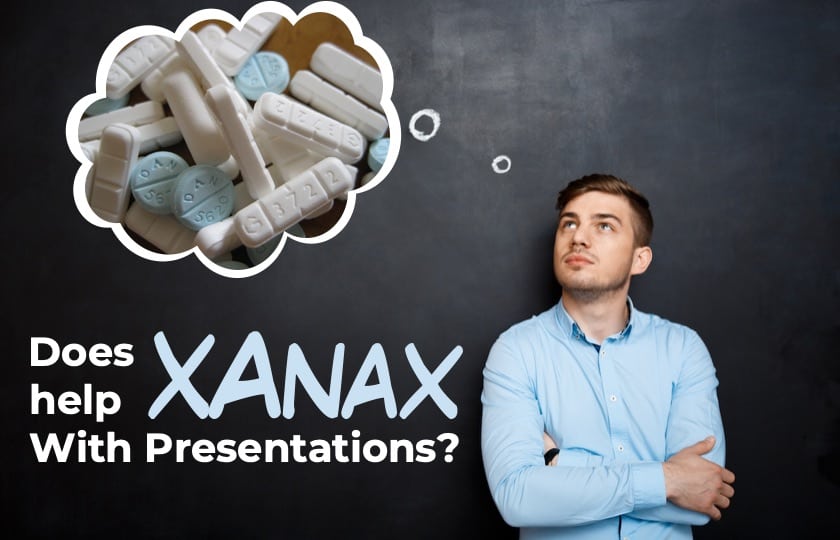You might have heard that taking Xanax is an effective way to reduce anxiety before a presentation. However, you might also be wondering if it is safe to take or whether it will even work for you!
Xanax resolves the chemical imbalances in the brain which can make giving a presentation less stressful. It is an effective drug designed to reduce the effects of Social Anxiety Disorder (SAD) and panic attacks. However, there are a number of side effects, including addiction, which should be considered.
You should always consult a doctor before using Xanax or any other Benzodiazepines. However, here’s a brief guide to help you understand how they can help, along with their associated risks.
What is Xanax?

Xanax is a drug used to help in suppressing the nervousness and anxiousness caused by a number of social disorders. The name ‘Xanax’ is, in fact, just a brand name for the drug – which is officially called ‘alprazolam’, which is a member of the benzodiazepine family.
It is the single most prescribed psychiatric drug in the US; and for many it has been a safe and effective means of overcoming psychological issues from Social Anxiety Disorder (SAD) through to panic attacks.
Other names for the drug include:
- Zannies
- Sticks
- Benzos
- Blue Footballs
- Handlebars
How Does Xanax help to Cope with Stressful Situations?

Simply speaking, Xanax helps by reducing the levels of stress you feel as a result of a given social situation – which might include giving a presentation. This means that for many people they are an effective way of chemically coping with the stresses associated with public speaking.
According to the National Social Anxiety Center, 73% of people in the world experience some form of glossophobia (the fear of public speaking sometimes called SAD). Given this stat, it is no surprise that Xanax is used by professionals the world over to mentally prepare for a stressful presentation.
Xanax is particularly effective, in the case of giving presentations, as it dulls the fear of judgment from others. This is one of the main factors causing stress among people giving presentations. As such, a person giving a presentation on Xanax is more likely to come across as confident and certain about what they are saying.
That said, Xanax will not eliminate all anxious feeling forever. It simply reduces the feelings for the duration in which the drug is taken and only maintains an effect on your body for a short period. This is typically between four and six hours, depending on an individual’s dose and other physiological factors.
How Does Xanax Work?
Xanax works by binding to Gamma-Amino Butyric Acid (GABA) receptors in your brain. These are neurotransmitters, which are supposed to help regulate the levels of neural excitability – such as nervousness and anxiousness.
Obviously, as with any chemical reaction within our bodies, some people produce more GABA than others. Therefore, those who produce less are more susceptible to stress and anxiety because their body has less capacity to regulate such feelings.
By binding to the GABAs, Xanax slows down the neural activity associated with such negative feelings. This leaves the person who takes them feeling calmer, more relaxed and, in some cases, sleepy.
Xanax is typically prescribed by doctors for a period of 8 weeks, however, most people do not find it hard to have the pills re-prescribed for another cycle after this period comes to an end.
What are the Risks of Using Xanax Frequently?
As with any medical procedure, no matter if it is having an operation or taking a pill (as in the case of Xanax) there will inevitably be an associated risk. After all, you are fundamentally altering your body’s chemical balance, which will have knock-on effects beyond those that you might wish, and which might lead to a negative outcome.
The risks included in taking Xanax are numerous. As a result, you should not take Xanax if you are any of the following:
- Pregnant or Nursing
- Taking Birth Control Pills, Antihistamines, Anticonvulsants or other psychotropic medications.
- Allergic to Benzodiazepines
- Are also taking itraconazole (Sporanox) or ketoconazole (Nizoral)
- Under 18
It is also very important that you do not drink while you are taking Xanax. This is a particular problem in the world of business, where someone might take a Xanax to give a presentation at a conference and then head to the bar afterwards to network and socialise with colleagues.
Furthermore, as per a research report by the National Centre for Biotechnology Information – U.S National Library of Medicine, it was observed that Xanax has a greater effect on people with Asian heritage than those of other races. Research suggests that they are more likely to ‘feel high’ and experience a spike in blood pressure as a result of taking the drug when compared to their white counterparts.
Therefore, you should consult a doctor before taking Xanax; and you should seek emergency medical help if you notice any adverse effects of taking it.
Side-effects of Xanax

While Xanax can be a safe and useful means of coping with the stresses of daily life for some, it can be the cause of a number of unwanted side-effects. In some cases, these can come as a result of taking too much of the drug, but it is also important to remember that some people react negatively to the drug even if taking the correct dosage.
The most common side effects of taking Xanax is drowsiness. For this reason, you should not drive or operate heavy machinery while you are on the medication. That said, this is one of the less serious side effects caused by Xanax. Especially in circumstances where a user takes an overdose, there can be much more severe, dangerous and long-lasting effects associated with the drug.
For example, an overdose of Xanax can cause; fainting, loss of balance, muscle weakness, slowed heart rate, confusion and, in some cases, it can even induce a coma.
Can you Get Addicted to Xanax?

Addiction is a serious concern when it comes to the taking of Xanax for simple cases of social anxiety. The American Addiction Center cites an interesting stat captured from the Journal of Addictive Behaviours which estimates that as many as 44% of ‘chronic benzodiazepine’ users become addicted!
One reason for this level of addiction is that the brain becomes accustomed to the relaxed state associated with the drug. If a user returns to a normal level of stress, without access to the drug, this can feel overwhelming. This results in an even greater level of anxiety than was experienced in the first place, and therefore a certain level of dependency on the drug.
Addiction to Xanax does not only come in a psychological sense. Many people who become dependent on the drug develop a physical dependency, which include; shortness of breath, vomiting and seizures. Benzodiazepines, including Xanax, were the primary reason for more than 44,000 visits to the emergency room in US hospitals in 2011.
As mentioned above, taking any drug induces chemical alterations to your body which may have long-lasting negative effects on your body. This is why you should consult a doctor before taking the drug and should explore other, non-chemical alternatives where possible.
Whar are the Alternatives to Xanax?

While the use of Xanax is not problematic for many people, you may wish to eliminate any possibility of severe medical problems by exploring alternatives methods for controlling your anxiety in the lead up to a presentation.
One of the first things to consider is your diet. It might sound convoluted to suggest that what you eat might have a significant impact on your ability to calmly and confidently give a presentation, however, the research suggests that diet might be one of the most effective ways to reduce stress.
Research shows that by simply consuming basic nutrients such as Omega 3 and Vitamin E, you can reduce your blood pressure. This means that blood flows more freely to your brain, which will impact the production of those chemicals which result in a more positive mindset.
What’s more, if you are healthier, you are more likely to feel confident in how you look. Therefore, the combined boost of feeling and looking great will reduce your levels of anxiety when it comes to giving your presentation.
That said, changing your diet could be seen to be a more long-term fix. What if you have a presentation next week? Well, two of the simplest ways to reduce anxiety in the short term is to have a good night’s sleep in the build-up to your presentation.
A lack of sleep can make you more emotionally reactive, more responsive to negative emotion and impulsive – all of which are key reasons for taking Xanax in the first place. Therefore, while it may be a useful drug in dealing with your anxiety, there are a number of alternative methods for achieving the same goal, which do not require you to consume Xanax or any other Benzodiazepine.
Disclaimer:
This blog provides general information and discussions about health and related subjects. The information and other content provided in this blog, or in any linked materials, are not intended and should not be construed as medical advice, nor is the information a substitute for professional medical expertise or treatment.
If you or any other person has a medical concern, you should consult with your health care provider or seek other professional medical treatment. Never disregard professional medical advice or delay in seeking it because of something that have read on this blog or in any linked materials.
If you think you may have a medical emergency, call your doctor or emergency services immediately. The opinions and views expressed on this blog and website have no relation to those of any academic, hospital, health practice or other institution.

